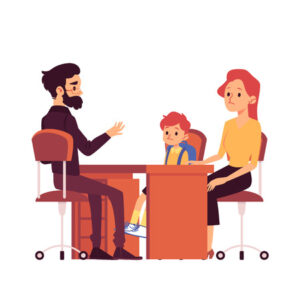If you’re a student who is struggling in school, or if you’re a parent of a child who is struggling, you may be wondering about the role of a school counselor. What do they do? How can they help? In this comprehensive guide, we will answer all your questions about school counseling! We’ll discuss who are school counselors, what services they provide, and how they can be helpful.
Contents
What Is School Counseling?

School counseling refers to the collaborative efforts of students, teachers, counselors, and administration to ensure the overall well-being of everybody involved. School counselors play an essential role in this process. But who exactly are school counselors and what do they exactly do? It is important to understand their role in this process.
Who Is A School Counselor?
School counselors act as advocates for the student’s well-being, listening to their concerns in a caring, non-judgemental way. These concerns are not only limited to academic concerns but may also include aspects like student’s home life, self-esteem, interpersonal relations, etc. They ensure to inbuild a sense of trust and confidentiality, even in a school setting, for the students in need of moral support. School counselors
What Does A School Counselor Do?

The main role of a school counselor is to help students find solutions to their academic and personal problems. This may involve providing resources, making referrals, or leading group counseling sessions. Sometimes, all a student needs is someone to talk to; in these cases, the counselor will provide a safe and confidential space for the student to express themselves.
School counselors also provide additional academic support in form of career counseling, helping students with college selection/applications, etc.
In certain additional cases wherein a student shows signs of a serious mental health condition or has self-harm/suicidal tendencies, appropriate authorities may be involved along with specialized mental health professionals.
School counselors further collaborate with teachers to work on the academic performance of those with significantly unsatisfactory performance or those with learning/intellectual disabilities. As these children require special attention, it is important to be in sync with the balance of their mental, emotional, and academic outlooks.
In addition to student welfare, counselors also look after the teacher’s emotional and mental well-being by organizing regular check-ins and peer support groups.
Roles And Responsibilities Of A School Counselor
School counselors can rightly be considered
- promoting the importance of students’ mental health
- provide academic and vocational guidance
- consequently, enhancing students’ interpersonal relationships
- provides an inclusive and safe space for those having academic or personal issues
- inculcating a safe space for children feeling emotionally vulnerable
- giving honest feedback to parents concerned about their child’s overall development in school
- assess the standards of teaching to provide quality education
- maintaining confidentiality
- building trust between the student and the counselor
- serving as a resource for parents, teachers, and administrators
- academic/personal/social support for all students
How To Become A School Counselor?

Although varying schools have varying criteria/desired experience, the required mandate for every counselor is a bachelor’s and masters’ degree in psychology/social work/education/childhood/special education studies along with preferred certification/training/diploma required by the respective institute.
What Is The Difference Between A Teacher And A Counselor?
The evidently main difference between a teacher and a counselor is that counselors are not responsible for teaching students academic content. Instead, their focus is on helping students with social, emotional, and behavioral issues.
Teaching follows a very structured style while counseling is more fluid in nature.
Counseling also serves the purpose of enhancing the life quality of students, and teaching is more concerned with academic obligations which are directed by the authorities.
Teachers make students participate in active listening, while counselors encourage students to engage in interactive conversations.
Furthermore, a teacher’s job is to instruct. However, a counselor’s job is to listen.
Conclusion
If your child is struggling in school, don’t hesitate to reach out to a school counselor. These professionals can surely provide invaluable support and guidance. We hope this guide has helped you better understand the role of school counselors and how they can help!
A Word From Therapy Mantra
Your mental health — Your psychological, emotional, and social well-being — has an impact on every aspect of your life. Positive mental health essentially allows you to effectively deal with life’s everyday challenges.
At TherapyMantra, we have a team of therapists who provide affordable online therapy to assist you with issues such as depression, anxiety, stress, workplace Issues, addiction, relationship, OCD, LGBTQ, and PTSD. You can book a free therapy or download our free Android or iOS app.


